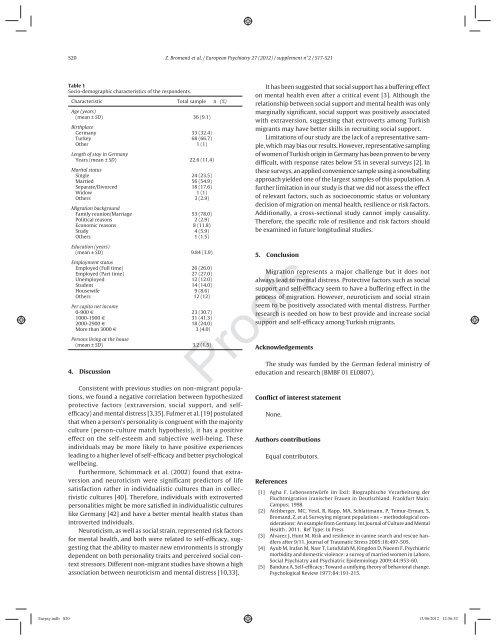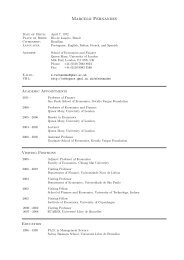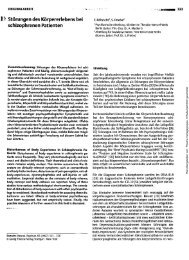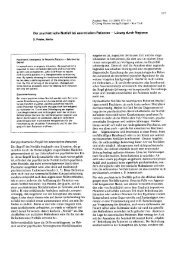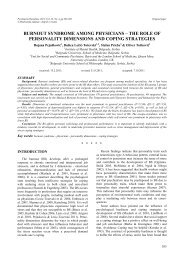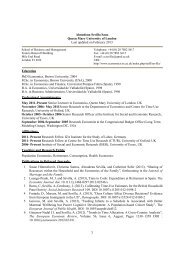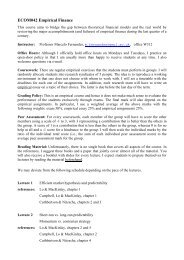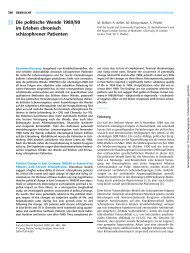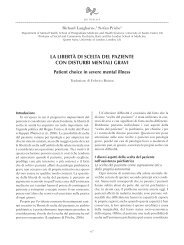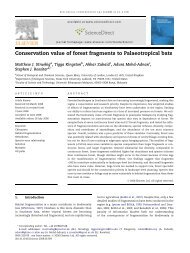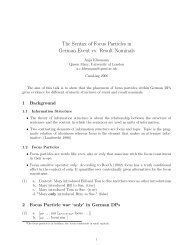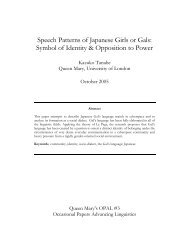Proofs - Personal Webspace for QMUL - Queen Mary, University of ...
Proofs - Personal Webspace for QMUL - Queen Mary, University of ...
Proofs - Personal Webspace for QMUL - Queen Mary, University of ...
You also want an ePaper? Increase the reach of your titles
YUMPU automatically turns print PDFs into web optimized ePapers that Google loves.
S20 Z. Bromand et al. / European Psychiatry 27 (2012) / supplement n°2 / S17-S21<br />
Table 1<br />
Socio- demographic characteristics <strong>of</strong> the respondents.<br />
Characteristic Total sample n (%)<br />
Age (years)<br />
(mean ± SD) 36 (9.1)<br />
Birthplace<br />
Germany<br />
Turkey<br />
Other<br />
4. Discussion<br />
33 (32.4)<br />
68 (66.7)<br />
1 (1)<br />
Length <strong>of</strong> stay in Germany<br />
Years (mean ± SD) 22.6 (11.4)<br />
Marital status<br />
Single<br />
Married<br />
Separate/Divorced<br />
Widow<br />
Others<br />
Migration background<br />
Family reunion/Marriage<br />
Political reasons<br />
Economic reasons<br />
Study<br />
Others<br />
24 (23.5)<br />
56 (54.9)<br />
18 (17.6)<br />
1 (1)<br />
3 (2.9)<br />
53 (78.0)<br />
2 (2.9)<br />
8 (11.8)<br />
4 (5.9)<br />
1 (1.5)<br />
Education (years)<br />
(mean ± SD)<br />
Employment status<br />
9.84 (3.9)<br />
Employed (Full time)<br />
26 (26.0)<br />
Employed (Part time)<br />
27 (27.0)<br />
Unemployed<br />
12 (12.0)<br />
Student<br />
14 (14.0)<br />
Housewife<br />
9 (8.6)<br />
Others<br />
Per capita net income<br />
12 (12)<br />
0- 900 €<br />
23 (30.7)<br />
1000- 1900 €<br />
31 (41.3)<br />
2000- 2900 €<br />
18 (24.0)<br />
More than 3000 €<br />
3 (4.0)<br />
Persons living at the house<br />
(mean ± SD) 3.2 (1.5)<br />
Consistent with previous studies on non- migrant populations,<br />
we found a negative correlation between hypothesized<br />
protective factors (extraversion, social support, and selfeffi<br />
cacy) and mental distress [3,35]. Fulmer et al. [19] postulated<br />
that when a person’s personality is congruent with the majority<br />
culture (person- culture match hypothesis), it has a positive<br />
effect on the self- esteem and subjective well- being. These<br />
individuals may be more likely to have positive experiences<br />
leading to a higher level <strong>of</strong> self- effi cacy and better psychological<br />
wellbeing.<br />
Furthermore, Schimmack et al. (2002) found that extraversion<br />
and neuroticism were significant predictors <strong>of</strong> life<br />
satisfaction rather in individualistic cultures than in collectivistic<br />
cultures [40]. There<strong>for</strong>e, individuals with extroverted<br />
personalities might be more satisfi ed in individualistic cultures<br />
like Germany [42] and have a better mental health status than<br />
introverted individuals.<br />
Neuroticism, as well as social strain, represented risk factors<br />
<strong>for</strong> mental health, and both were related to self- effi cacy, suggesting<br />
that the ability to master new environments is strongly<br />
dependent on both personality traits and perceived social context<br />
stressors. Different non- migrant studies have shown a high<br />
association between neuroticism and mental distress [10,33].<br />
It has been suggested that social support has a buffering effect<br />
on mental health even after a critical event [3]. Although the<br />
relationship between social support and mental health was only<br />
marginally signifi cant, social support was positively associated<br />
with extraversion, suggesting that extroverts among Turkish<br />
migrants may have better skills in recruiting social support.<br />
Limitations <strong>of</strong> our study are the lack <strong>of</strong> a representative sample,<br />
which may bias our results. However, representative sampling<br />
<strong>of</strong> women <strong>of</strong> Turkish origin in Germany has been proven to be very<br />
diffi cult, with response rates below 5% in several surveys [2]. In<br />
these surveys, an applied convenience sample using a snowballing<br />
approach yielded one <strong>of</strong> the largest samples <strong>of</strong> this population. A<br />
further limitation in our study is that we did not assess the effect<br />
<strong>of</strong> relevant factors, such as socioeconomic status or voluntary<br />
decision <strong>of</strong> migration on mental health, resilience or risk factors.<br />
Additionally, a cross- sectional study cannot imply causality.<br />
There<strong>for</strong>e, the specifi c role <strong>of</strong> resilience and risk factors should<br />
be examined in future longitudinal studies.<br />
5. Conclusion<br />
Migration represents a major challenge but it does not<br />
always lead to mental distress. Protective factors such as social<br />
support and self- effi cacy seem to have a buffering effect in the<br />
process <strong>of</strong> migration. However, neuroticism and social strain<br />
seem to be positively associated with mental distress. Further<br />
research is needed on how to best provide and increase social<br />
support and self- effi cacy among Turkish migrants.<br />
Acknowledgements<br />
<strong>Pro<strong>of</strong>s</strong><br />
The study was funded by the German federal ministry <strong>of</strong><br />
education and research (BMBF 01 EL0807).<br />
Confl ict <strong>of</strong> interest statement<br />
None.<br />
Authors contributions<br />
Equal contributors.<br />
References<br />
[1] Agha F. Lebensentwürfe im Exil: Biographische Verarbeitung der<br />
Fluchtmigration iranischer Frauen in Deutlschland. Frankfurt Main:<br />
Campus; 1998.<br />
[2] Aichberger, MC, Yesil, R, Rapp, MA, Schlattmann, P, Temur- Erman, S,<br />
Bromand, Z, et al. Surveying migrant populations – methodological considerations:<br />
An example from Germany. Int.Journal <strong>of</strong> Culture and Mental<br />
Health . 2011. Ref Type: In Press<br />
[3] Alvarez J, Hunt M. Risk and resilience in canine search and rescue handlers<br />
after 9/11. Journal <strong>of</strong> Traumatic Stress 2005;18:497- 505.<br />
[4] Ayub M, Irafan M, Nasr T, Lutufulah M, Kingdon D, Naeem F. Psychiatric<br />
morbidity and domestic violence: a survey <strong>of</strong> married women in Lahore.<br />
Social Psychiatry and Psychiatric Epidemiology 2009;44:953- 60.<br />
[5] Bandura A. Self- effi cacy: Toward a unifying theory <strong>of</strong> behavioral change.<br />
Psychological Review 1977;84:191- 215.


